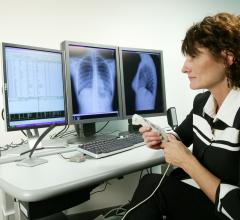Purdue University researchers have created the first 2-D images of biological samples using a new mass spectrometry technique that furthers the technology's potential applications for the detection of diseases such as cancer.
Desorption electrospray ionization (DESI) measures characteristic chemical markers that distinguish diseased from non-diseased regions of tissue samples within a few seconds and has eliminated the need for samples to be treated with chemicals and specially contained.
"This technology could be used to aid surgeons in precisely and completely removing cancerous tissue," said Graham Cooks, Purdue's Henry B. Hass distinguished professor of Analytical Chemistry. "With these images, we can see the exact location of tumor masses and can detect cancerous sites that are indistinguishable to the naked eye."
© Copyright Wainscot Media. All Rights Reserved.
Subscribe Now


 July 28, 2017
July 28, 2017 




